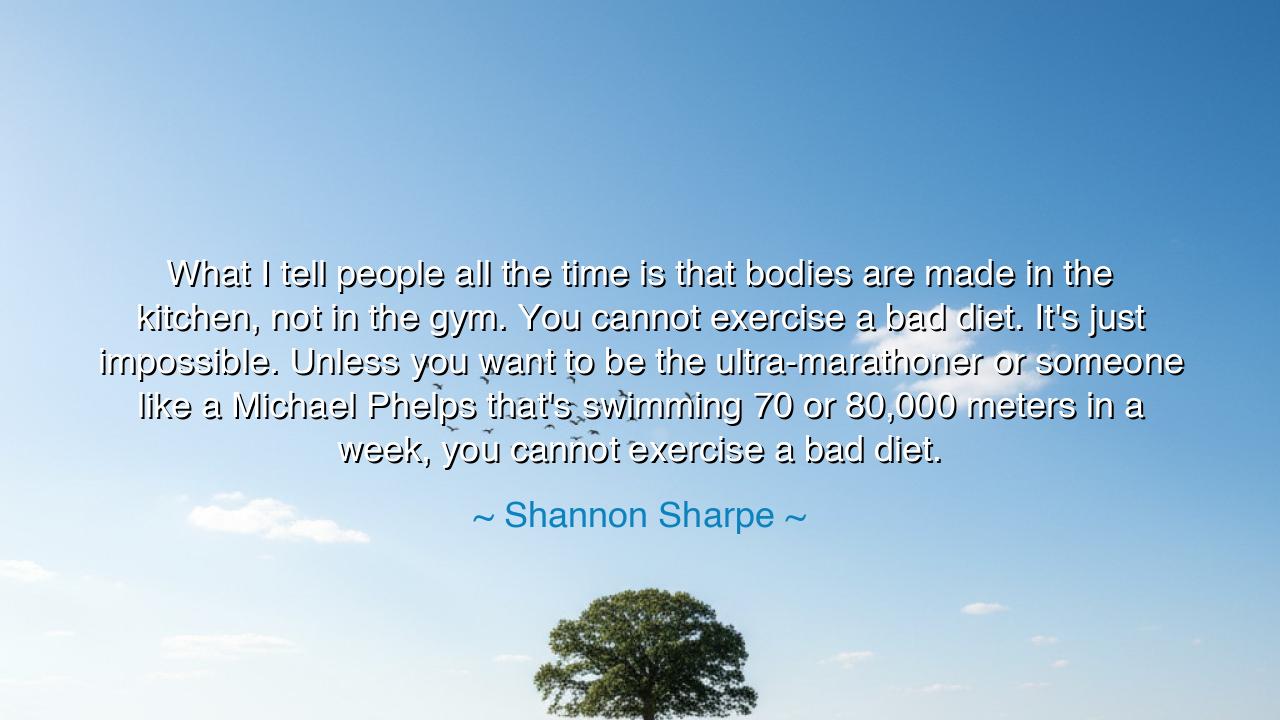
What I tell people all the time is that bodies are made in the
What I tell people all the time is that bodies are made in the kitchen, not in the gym. You cannot exercise a bad diet. It's just impossible. Unless you want to be the ultra-marathoner or someone like a Michael Phelps that's swimming 70 or 80,000 meters in a week, you cannot exercise a bad diet.






In the words of Shannon Sharpe, “What I tell people all the time is that bodies are made in the kitchen, not in the gym. You cannot exercise a bad diet. It's just impossible. Unless you want to be the ultra-marathoner or someone like a Michael Phelps that's swimming 70 or 80,000 meters in a week, you cannot exercise a bad diet,” there rings a truth as ancient as the human struggle for balance. Though he speaks as an athlete of modern times, his words carry the wisdom of the ancients, the understanding that strength and beauty are not born from exertion alone, but from discipline, harmony, and self-governance. It is a lesson that reaches beyond the realm of sport and into the heart of life itself: that true mastery begins not in outward effort, but in inward control.
To say that “bodies are made in the kitchen” is to proclaim that form follows foundation. The ancients knew this truth long before the rise of modern science. In the schools of Greece, athletes of the Olympic games trained their minds and their diets as carefully as their limbs. The philosopher Hippocrates, father of medicine, declared that “food is thy medicine,” for he knew that the quality of one’s fuel determined the quality of one’s life. Shannon Sharpe, in his own way, speaks this same creed: that strength is not built merely through labor, but through wisdom—through choosing what one consumes, both in body and in spirit.
When he says, “You cannot exercise a bad diet,” he reminds us of an eternal paradox of human nature: the desire to outwork poor decisions rather than avoid them. But the body, like the soul, keeps perfect record of every choice. No matter how tirelessly one labors, no victory in the gym can undo the harm of neglect at the table. The ancients would call this the Law of Proportion—that harmony cannot exist when one element overwhelms another. The body, being nature’s finest instrument, demands balance: nourishment as its melody, movement as its rhythm. To train one without honoring the other is to play a song forever out of tune.
Consider the story of Milo of Croton, the legendary wrestler of ancient Greece. He became famed for his strength, which he cultivated not only through his training, but through his careful sustenance. It was said that as a youth he carried a calf on his shoulders each day until it grew into a full-grown bull—his muscles grew as the animal did. But his true genius lay in balance: his diet, his rest, and his exercise worked in perfect harmony. When, in pride, he later ignored that balance—attempting to tear apart a tree with bare hands, his body weakened by excess and age—the tree crushed him. Thus, even the mighty fall when they forget that strength is sustained not by pride or effort alone, but by discipline and moderation.
Sharpe’s invocation of the ultra-marathoner or Michael Phelps is not merely an example, but a symbol of extremity. These are individuals who burn their energy at the edge of human endurance, consuming food as fire to sustain motion. Yet such a life is not the ordinary man’s path. For most, the pursuit of health and strength is not about consuming or expending more, but about living with awareness. The lesson is simple but profound: the majority of our victories are won in stillness—in the choices made before the first step, the first lift, the first motion. The gym refines what the kitchen builds.
His words also hold a moral mirror. The phrase “You cannot exercise a bad diet” could just as easily apply to the spirit. One cannot outwork a poisoned mind with good intentions, nor overcome bad habits with bursts of effort. The ancients taught that virtue, like health, must be cultivated daily—not through grand acts, but through the quiet accumulation of wise choices. A man who feeds his body poorly weakens his muscles; a man who feeds his soul with corruption weakens his character. The principle is universal: what we consume becomes what we are.
Let this teaching, then, be carried as wisdom for all generations: discipline begins with choice, not with action. If you would build strength, begin with what you take into yourself—whether food, thought, or influence. Let your nourishment be pure, your habits deliberate, your desires tempered. The gym, the field, the battlefield—these are but stages for the strength that was forged in silence long before.
Thus, remember the wisdom of Shannon Sharpe, a modern philosopher of effort and restraint: The body is built not in sweat alone, but in self-control. The one who masters his appetite masters his destiny. The one who governs his choices governs his life. To live well, eat with intention, move with purpose, and dwell in harmony with your nature—for in such balance lies not only health, but the calm power that the ancients called arete, the excellence of the human soul.






AAdministratorAdministrator
Welcome, honored guests. Please leave a comment, we will respond soon